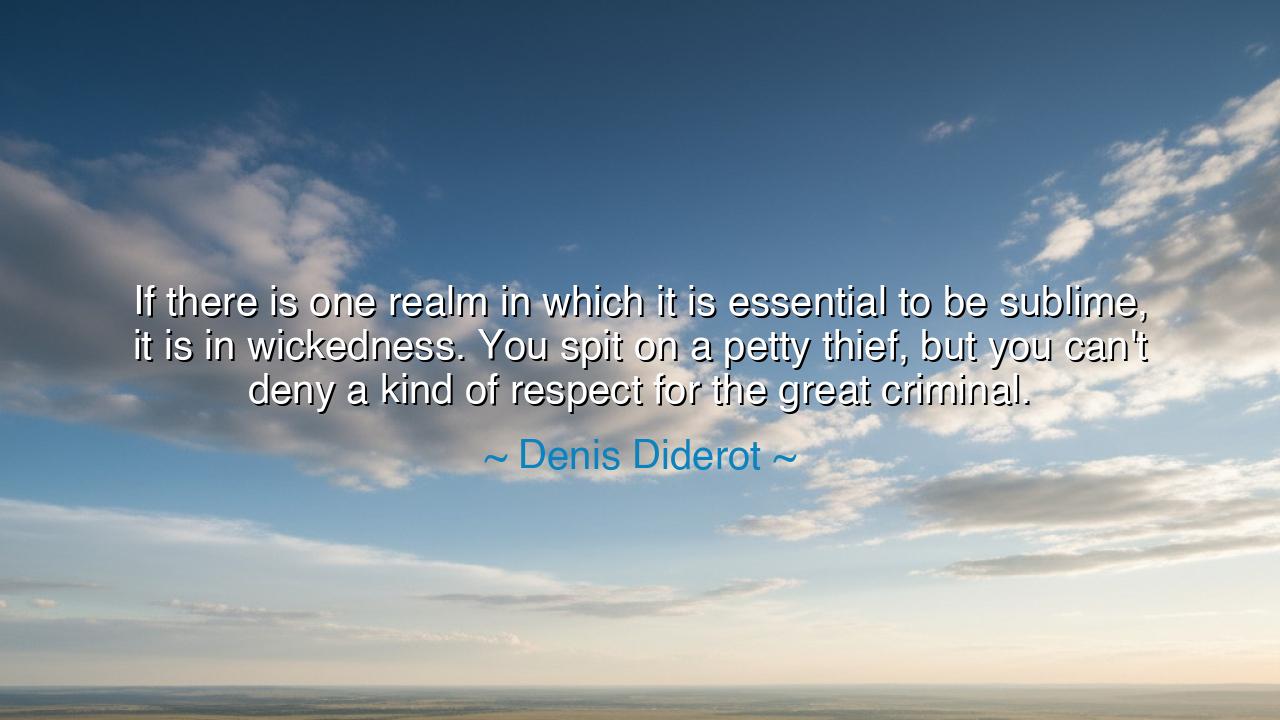
If there is one realm in which it is essential to be sublime, it
If there is one realm in which it is essential to be sublime, it is in wickedness. You spit on a petty thief, but you can't deny a kind of respect for the great criminal.






Hearken, O seekers of wisdom and students of the human soul, to the words of Denis Diderot, who observed: "If there is one realm in which it is essential to be sublime, it is in wickedness. You spit on a petty thief, but you can't deny a kind of respect for the great criminal." Within these words lies a profound meditation on power, audacity, and the nature of human character. Diderot invites us to recognize that even in wickedness, greatness commands attention, and that the scope of one’s deeds—good or ill—shapes the awe they inspire.
Since the earliest days of civilization, philosophers have pondered the interplay of virtue and vice, of courage and cruelty. The ancients understood that small crimes, petty betrayals, or trivial deceptions are contemptible because they lack vision, daring, or consequence. Yet when a figure emerges who bends fate itself through audacious wickedness, one cannot help but feel a strange mixture of fear, admiration, and astonishment. Diderot’s insight teaches that human perception of power is intertwined with scale and audacity, not merely morality.
Consider the tale of Al Capone, the notorious gangster of 1920s Chicago. Though society condemned him, even historians acknowledge the brilliance of his organizational genius, the sheer audacity of his operations, and the extraordinary influence he wielded over the city. While petty criminals provoke disdain, Capone—like the “great criminal” Diderot describes—elicits a complicated respect, for his acts reshape the world around him, demanding recognition even from those who oppose him.
Diderot’s reflection is not a call to glorify wickedness, but an invitation to perceive sublimity in human action, regardless of its moral alignment. In observing the scale and consequence of deeds, we cultivate discernment, understanding that human potential, whether for good or ill, is measured by vision, courage, and impact. The petty thief acts from impulse; the great criminal acts from strategy, daring, and intellect—a chilling reminder of the power of human will when applied with purpose.
The ancients offered similar contemplations. In Greek tragedy, figures like Oedipus or Clytemnestra commit acts that bring ruin and sorrow, yet their grandeur, ambition, and audacity command the audience’s attention and awe. The petty transgressions of minor characters provoke scorn, but the monumental choices of these figures inspire reflection on fate, morality, and the magnitude of human potential. Diderot’s observation resonates in this ancient wisdom: magnitude amplifies perception, demanding contemplation even in wrongdoing.
The lesson is profound: recognize that human actions resonate according to scale, vision, and audacity, and that greatness—whether in virtue or vice—elicits response. To study history, to observe character, is to understand that the ordinary evokes disdain, the extraordinary evokes contemplation. By discerning these subtleties, we sharpen our judgment and our understanding of human nature.
Practical action flows from this wisdom: examine deeds not only through the lens of morality but through the lens of magnitude, impact, and intention. Honor the courage and vision that transform the world, while steadfastly rejecting malevolence. In doing so, you cultivate discernment, separating the petty from the profound, and learn to navigate the complexities of influence and consequence with wisdom.
O seeker of understanding, remember this: wickedness, when executed with audacity, commands a form of respect, not for its morality, but for the sublimity of will and execution. Let the words of Denis Diderot illuminate your contemplation of human action, teaching that the grandeur of deeds, for good or ill, shapes the awe and reflection of those who witness them. In understanding this, one learns not to glorify evil, but to appreciate the measure of human potential and the responsibility that comes with it.
I can also craft a narrative, oral-style version, with rises, pauses, and dramatic emphasis, so it reads like an ancient teaching aloud. Do you want me to do that?






AAdministratorAdministrator
Welcome, honored guests. Please leave a comment, we will respond soon